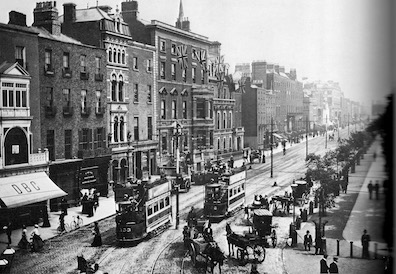The Dublin Bread Company operated tearooms and restaurants at
four locations in Dublin: at the base of O'Connell Street, on the
northern edge of St. Stephen's Green, near the National Library on
Kildare Street, and at 33 Dame Street. In Lestrygonians
Bloom associates one of these with the bloviating of
nationalist politicians and gets the name slightly wrong:
"Want to gas about our lovely land. Gammon and spinach. Dublin
Bakery Company's tearoom. Debating societies. That
republicanism is the best form of government. That the
language question should take precedence of the economic
question." Although the location of this D. B. C. is not
specified, it must be the Dame Street establishment given its
proximity to City Hall. In section 15 of Wandering Rocks
Jimmy Henry expresses impatience with council members
endlessly discussing the "damned Irish language"––consistent
with Bloom's account of nationalist political debates
conducted in a tearoom.
One page later in Lestrygonians Bloom thinks of John
Howard Parnell neglecting his job to play chess: "Must be a corporation
meeting today. They say he never put on the city
marshal's uniform since he got the job.... Look at the
woebegone walk of him. Eaten a bad egg. Poached eyes on ghost.
I have a pain.... Drop into the D. B. C. probably for his
coffee, play chess there." Gifford notes that the smoking room
of the Dame Street restaurant was "a meeting place for chess
players," and in a personal communication Vincent Altman
O'Connor tells me that Joyce's friend J. F.
Byrne regularly played chess there. In section 16 of Wandering
Rocks Mulligan (who was told in Scylla and Charybdis
that Haines had said "He'll see you after at the D. B. C.")
directs his companion's attention to a man playing chess near
their table in the tearoom. It is Parnell, looking just as
dyspeptic as Bloom imagines him.
Mulligan jokes about the acronym for the restaurant: "We
call it D. B. C. because they have damn bad cakes." The
flippant Dub quip does not stop him from ordering "some scones
and butter and some cakes as well" to go with the "Two mélanges"
that he and Haines have requested. Clive Hart glosses this
term (French for "mixtures") as "coffee made with milk or with
sugar and whipped cream," and he remarks on the francophile
sophistication of "the elegant D. B. C.," noting that "Haines
places the first order and it may be that Mulligan is too
little self-aware to notice that, in cooperating, he is
himself participating in a 'Paris fad' of the kind that he had
scorned in the morning" (James Joyce's Dublin,
53).
From this upscale setting there is quite a comedown to the
scene presented in the first interpolation. When last seen in
section 3 the "onelegged sailor" was leaving Dorset Street and
making his way up Eccles. Since then he has evidently
continued crutching along on this trajectory, because now he
is shown growling the same patriotic lyrics "at the area of
14 Nelson street," one long block west and half a
block south. In addition to the obvious contrast between
wealth and penury, the intruding sentence comes just after
Haines dismisses Stephen's talk by observing that "Shakespeare
is the happy huntingground of all minds that have lost their
balance," and just before Mulligan's joke about
Stephen's drunkenness: "You should see him...when
his body loses its balance." The sailor's body too has
lost its balance––as Hart notes, crediting Leo Knuth (Critical
Essays, 214). Stephen's tortured brilliance thus becomes
associated with a handicapped beggar. Hart adds, more
speculatively, that the words of the sailor's song, "England
expects," may also be applied to Haines.
At the end of the section there is a second interpolation: "Elijah,
skiff, light crumpled throwaway, sailed eastward by flanks
of ships and trawlers, amid an archipelago of corks, beyond
new Wapping street past Benson's ferry, and by the
threemasted schooner Rosevean from Bridgwater with bricks."
When last seen, in section 12, this crumpled
piece of paper was moving west––oddly, because high tide was
reached at 12:42 PM, but it was "rocked on the ferrywash" and
thus perhaps briefly swept off course. Now it has resumed the
eastward course seen in section 4. The "threemasted
schooner" is no doubt the sailing ship that Stephen
saw over his shoulder in Proteus, and it has moved
west on the incoming tide just as the throwaway has floated
east on the river. The interpolation comes just after Haines
tastes his mélange: "This is real Irish cream I
take it, he said with forbearance. I don't want to be
imposed on." Hart cannot discern any thematic linkage
here, but it seems ironically significant that a rich English
tourist demands authentically Irish cream just as a workaday
cargo vessel brings English bricks to construct Irish
buildings.
One narrative element is intriguingly absent. At the end of
section 15 the viceregal cavalcade passed by on Parliament
Street, not in an interpolation but as part of the present
action. Although not represented in that section, the
procession then turns left at City Hall onto Dame Street.
Since section 16 is set on Dame Street, and since the sections
seem to succeed one another in chronological order, one might
expect to catch sight of the cavalcade once again through the
windows of the D. B. C. Indeed, in section 19 Mulligan and
Haines do look out the restaurant's windows at the carriages
rolling by. But this sighting is not doubled in section 16.
For reasons that I do not presume to understand, Joyce did not
build on his striking innovation in section 15. Sections 17
and 18 likewise take place in the southeastern quadrant of
central Dublin in places that the cavalcade passes by, and the
people in them are shown gazing at the carriages in section
19. Joyce could certainly have provided glimpses of the
procession throughout sections 15-18 before doubling that
narration in section 19. He did not do that.



